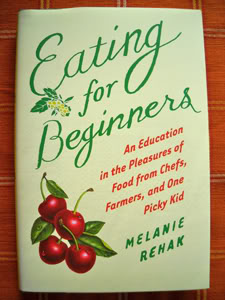
Have you heard about this book yet? Eating for Beginners: An Education in the Pleasures of Food from Chefs, Farmers, and One Picky Kid by Melanie Rehak was just published this week—and I only heard about it last week—so maybe not. But if you’re a) a parent, b) a person who cares about food and where it comes from, c) a fan of lovely, literate, crystal-clear writing, or d) all of the above, you’ll enjoy reading it as much as I did.
Eating for Beginners is another in a growing line of parental-essay-slash-recipe books, following Emily Franklin’s Too Many Cooks: Kitchen Adventures with 1 Mom, 4 Kids, and 102 Recipes, which I blogged about here, and Matthew Amster-Burton’s Hungry Monkey: A Food-Loving Father’s Quest to Raise an Adventurous Eater,
which I discussed here. (See? Three makes a trend.)
Just as those two books were vastly different from each other, Eating for Beginners stakes out its own piece of food-loving-parent real estate. While Melanie is clearly passionate about food and was before she ever started this book, she’d never worked as a cook or a food writer. That changed after her son, Jules, was born, when she began to question not only what to feed him, but how his food’s origins might matter for both him and the larger world. And it changed for good the day she volunteered at applewood, a Brooklyn locavore institution. Her book takes place over the course of a year spent in the kitchen there, as well as during overnight visits to the restaurant’s suppliers: vegetable farmers and cheesemakers, fishermen and small-scale meat producers. She provides glimpses of just how hard it is to raise food responsibly, and makes it clear that it’s worth the extra money to feed your family well (in every sense of the word). This is all played out against the stress that comes with raising an exceptionally picky child—seriously, he puts Harry to shame—and told with humor, grace, and remarkable insight. Rehak muses on everything from the joy that comes when your child finally eats a fish stick to the particular wistfulness that comes when butchering a slaughtered animal that you know personally.
My favorite part is at the end, when Jules suddenly, inexplicably decides to broaden his palate. But that’s for purely selfish reasons: I keep hoping that someday the same thing will happen with Harry. You’ll find reasons of your own to love this book; I’m sure of it.
